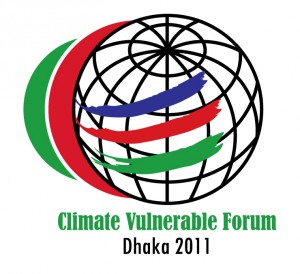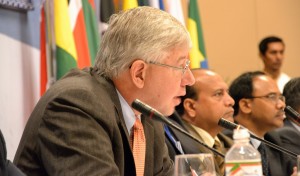November 13, 2011
 Speech presented at the Inauguration of the preparatory meeting at the Climate Vulnerable Forum 2011 in Dhaka, Bangladesh
Speech presented at the Inauguration of the preparatory meeting at the Climate Vulnerable Forum 2011 in Dhaka, Bangladesh
By Neal Walker, UNDP Resident Representative and U.N. Resident Coordinator, Kyrgyz Republic
I am extremely pleased to be here at the preparatory meeting of the Climate Vulnerable Forum.
Climate change is a powerful and very real global phenomenon. But we all know that it affects lives and livelihoods in very different ways, from one place, from one country, to another. This fact is the essence of this meeting, because we recognise that when it comes to the risks of climate change, some countries, your countries, are more vulnerable than others.
In the six months I’ve been in Bangladesh, I’ve seen real leadership by the Government on the international stage in calling for a global response to climate change. It feels right that we are meeting here in Dhaka today for Second Climate Vulnerable Forum, and once again, let me welcome you all to this timely event.
In Bangladesh, the United Nations Development Programme – UNDP, is proud to be a consistent and trusted partner in the country’s sustainable development endeavours. Environmental protection is a core element of our development mandate. Over the years, UNDP Bangladesh has played an important role in the development of policy and programmes that are securing better environmental and natural resource management. In close collaboration with national partners, we can see results! We see improved protection of important biodiversity; really successful work introducing cleaner fuels, the ubiquitous “CNG’s” in Dhaka; and in encouraging energy conservation. Throughout everything, UNDP promotes inclusive approaches that link poverty eradication and the environment.
The BIG question is, will the actions to date, be enough? Here today, the most vulnerable countries are represented, and I think we can all agree: more action is needed! The challenge of climate change in Bangladesh is easy to visualise: it is the combination of the melting Himalayas to the north, sending ever more unpredictable river-flow through the country, and the rising sea to the south. Indeed, many people in the vulnerable southern coastal belts are already feeling this: climate change in Bangladesh means more natural disasters that are more frequent, more intense and more destructive.
Clearly, response must be multi-faceted: it must be global, national and local; it must be at the policy level AND at the practical level. And while funding is important, it’s also about innovation and impact! Bangladesh’s pioneering and comprehensive disaster risk reduction and management system stands ready to show results on many fronts, in Bangladesh. But we know - I am sure that all of you know: this is only part of the response. To adequately deal with the problem we must also be seeking ways that capture and promote the best in ideas, technologies and opportunities to put all countries on a development path that is clean, green and sustainable.
From this perspective, the ‘win-win-win’ coastal afforestation project is an excellent and innovative example. It combines climate resilience by reclaiming lost land and protecting the coast; it promotes emission reductions by expanding carbon sinks and it strengthens social protection for the poorest through cash-for-work employment.
Along with adaptation, UNDP Bangladesh’s present portfolio seeks to push the low emission green development and green economy agenda forward. From the Brick Kiln Efficiency project which is demonstrating the real value in energy efficiency, to the CFC Phase- out projects or to a comprehensive portfolio of pipeline projects, UNDP is committed to our work in Bangladesh.
But today, for the record, I am here to represent UNDP’s actions worldwide, and I am confident in stating that we are proud to be a trusted partner in all vulnerable countries, supporting you to design innovative solutions to the challenge of climate change. Please allow me to provide two quick examples where countries here today, despite real resource constraints, are taking bold and positive steps.
First, our neighbors in Bhutan. Unprecedented glacial melt is posing serious and imminent risks in the form of Glacial Lake Outburst Floods (Let’s just call those “GLOFs”). GLOF events can release millions of cubic meters of water and debris into narrow mountain valleys causing catastrophic and sudden losses, losses of lives, livelihoods and economic infrastructure. In response to this threat, with support from UNDP and the GEF managed Least Developed Countries Fund, Bhutan is successfully draining one of its most dangerous glacial lakes – Lake Thorthomi. The project is also helping to establish an early warning system for hazard prone downstream areas, and local people are being trained in GLOF preparedness.
“Clearly, response must be multi-faceted: it must be global, national and local; it must be at the policy level AND at the practical level.“In another part of the world, in Ghana, with UNDP support, the Environmental Protection Agency and the National Disaster Management Organization apply an integrated approach to coordinate and manage climate change risks and opportunities. What does this mean in practice? It is local and national. At the local level, it means that the quality of local planning is made more responsive to local needs. Mechanisms ensure that local people can better communicate their needs to service providers and ensure that local authorities listen better. Working together they’re finding ways to bring in new ideas that build from local knowledge.
At the same time, Ghana is taking steps to reduce its national carbon footprint on a voluntary basis, promoting a green economy through the introduction of incentives to reduce energy wastage in the manufacturing sector.
In conclusion: all of the climate vulnerable countries assembled here today can provide evidence of a proactive stance in fighting climate change even though they bear no historical responsibility of causing greenhouse gas emissions.
So, it is your efforts that serve as an inspiration globally, and also for us in the UN system. Without your leadership, we are just a voice in the wind. But with your commitment, with your action, we in UN have the foundation we need to provide effective support. Indeed! We can help vulnerable countries access additional resources from global funds; we can help target policies and programmes towards the most vulnerable populations and the most urgent needs; and we’re energised to help you transform your economies towards climate smart and environmentally sustainable development.
As the discussions over the next two days will show, many of the solutions are already available and being implemented by the governments and peoples’ represented here. One of the key challenges now is to make this experience more visible and transferable, which is one of the objectives which underpin this event.
Looking forward though, we all recognise that much more needs to be done. We need to scale up the response - not through atomised projects or ‘one off’ initiatives, but through smarter, more comprehensive approaches. Sector policies offer one avenue of opportunity, by designing and putting in place incentives that can transform both the role of government, and the way it interacts with other players, notably the private sector.
I am delighted to be present at this important meeting. Climate change is one of the most complex and multifaceted challenges of our time. All of you represent countries that are the front-line victims, facing a disproportionate share of climate burden. I therefore thank all organisers and participants of this important meeting for your proactive stance in effectively addressing climate change.
I would also like to commend the Government of Bangladesh for the timely hosting of the Forum just prior to the COP meetings in Durban, and the Rio+20 meetings next year. This is a great opportunity to build bridges towards a constructive outcome in the COP negotiations in Durban. Durban outcomes can be further strengthened by the historic opportunity of Rio+20 Summit next year that specifically deals with pro-poor green economy and institutional framework for sustainable development themes.
Finally, I am especially encouraged by presence of the United Nations Secretary-General Mr. Ban Ki-moon who will speak at the Forum tomorrow. Please be aware it was his personal choice to significantly adjust his arrival date to be with you tomorrow. I can tell you all with deep pride, the Secretary-General: he’s my boss, and addressing climate change is one of his highest personal priorities. So, from the very top, please count on your United Nations Team, in whatever country you come from, for passionate, results-oriented support in your hard work.
I wish you every success in reaching a common and strong message on behalf of climate vulnerable countries.

Share this